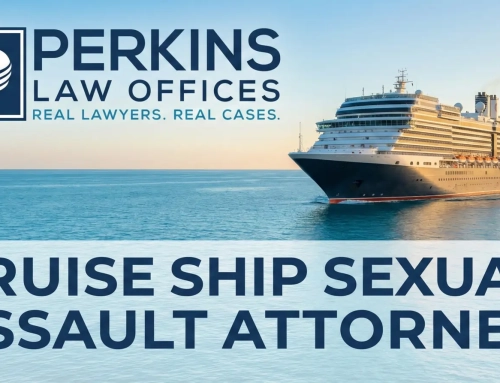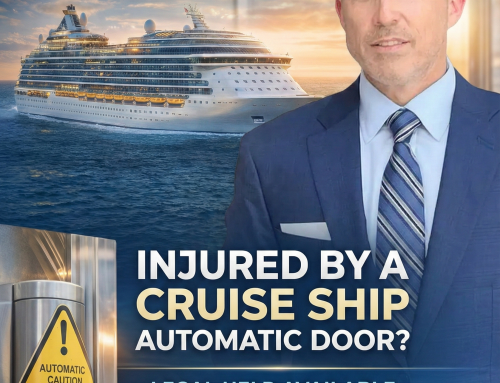When injuries occur at sea, passengers are often left wondering how to hold a cruise line accountable. At Perkins Law Offices in Miami, we represent clients who have suffered serious harm due to cruise ship negligence. If you were injured while on a cruise, understanding your rights and the legal options available under maritime law is essential. This page serves as a comprehensive guide to cruise ship compensation claims—what they are, who is eligible, and how to pursue the compensation you deserve.
Understanding Cruise Ship Compensation Claims
Cruise ship compensation claims are legal actions brought against cruise lines or related entities for injuries or damages sustained onboard. These may include personal injury, medical negligence, slip and fall accidents, or wrongful death. Maritime law—distinct from land-based personal injury law—governs these claims and has strict requirements and deadlines.
At the heart of a successful cruise ship injury claim is proving negligence. That means showing that the cruise line, or its employees, failed to act with reasonable care, leading to your injury. Claims can involve:
- Unsafe walking surfaces leading to slip and fall injuries
- Defective or poorly maintained ship equipment
- Negligent onboard medical care
- Inadequate security or supervision
- Failure to warn passengers of known hazards
What Types of Injuries Warrant Compensation?
Cruise ship injury compensation may be available for a wide range of incidents. Common cases we handle include:
Cruise Ship Slip and Fall Claims
Wet decks, unstable flooring, or poorly marked hazards often result in serious falls. These injuries can range from sprains to life-altering head or spinal injuries.
Medical Negligence Aboard Cruise Ships
Many passengers are unaware that onboard doctors may be independent contractors, not cruise line employees. Nonetheless, cruise ship medical negligence can still be grounds for compensation under certain legal arguments.
Cruise Ship Accident Claims from Excursions
Even off-ship activities arranged by the cruise line may involve liability. If you were injured on a shore excursion that was advertised or coordinated by the cruise company, you may still have grounds for a cruise ship personal injury claim.
Cruise Ship Injury Lawsuits Involving Assault or Crime
When cruise lines fail to provide adequate security or background checks, resulting in passenger assaults or theft, you may pursue a cruise ship lawsuit compensation claim.
How to Start the Cruise Ship Claim Process
Pursuing a cruise ship accident compensation claim starts with knowing your legal rights and acting quickly. Most cruise lines include specific terms in their ticket contracts requiring notice of injury within six months and a lawsuit filed within one year.
Step 1: Preserve Evidence
Document everything. Take photos of the scene, your injuries, and get names of witnesses. Keep copies of your medical records, communications with the cruise line, and any incident reports filed onboard.
Step 2: Contact a Cruise Ship Injury Lawyer
Experienced legal representation is critical. At Perkins Law Offices, we know the unique complexities of maritime injury compensation and how cruise lines defend against these claims.
Step 3: File Your Cruise Injury Claim Form
Most claims begin by submitting a formal notice of intent to sue, followed by filing your complaint in federal court. Many cruise lines require lawsuits be filed in the Southern District of Florida—even if the injury occurred elsewhere.
Why Choose Perkins Law Offices
Led by maritime injury attorney Alexander Perkins, our firm has decades of experience handling cruise ship accident claims. We understand the tactics cruise lines use to delay or deny valid claims and have recovered millions on behalf of injured passengers. As a seasoned cruise ship compensation lawyer, Mr. Perkins brings both legal precision and compassion to every case.
Addressing Common Concerns About Cruise Injury Claims
“Can I sue the cruise line if I signed a waiver?”
Yes. Waivers do not always absolve the cruise line from responsibility, especially if negligence can be proven.
“Is the cruise ship liable for medical mistakes made by the onboard doctor?”
Possibly. If the cruise line promoted onboard care as part of its service, it may be liable for negligent treatment.
“Do I need a lawyer for a cruise ship compensation claim?”
Absolutely. Maritime law is a complex area with tight deadlines and procedural traps. A cruise ship injury compensation lawyer can ensure you meet all requirements and maximize your recovery.
FAQs About Cruise Ship Compensation Claims
How much time do I have to file a cruise ship injury claim?
Most cruise ticket contracts require passengers to provide written notice of their claim within six months and file a lawsuit within one year of the incident. Failure to comply can result in your claim being barred.
What is the average settlement for a cruise ship injury?
While each case is different, cruise ship injury settlements typically range from $50,000 to $500,000, depending on the severity of the injury, negligence involved, and long-term consequences.
Who is liable for cruise ship accident compensation?
Liability can rest with the cruise line, its employees, third-party excursion providers, or even contractors like shipboard medical staff—depending on the nature of the injury and contributing factors.
Can I get compensation if I was partly at fault?
Yes. Maritime law may apply comparative fault principles, meaning your compensation could be reduced but not necessarily denied if you were partially responsible for your injury.
How much does it cost to hire a cruise ship injury attorney?
Most cruise ship injury attorneys, including Perkins Law Offices, work on a contingency fee basis—meaning you pay nothing unless we recover compensation on your behalf.
If you or a loved one suffered an injury aboard a cruise, don’t wait. Contact Perkins Law Offices in Miami today for a free consultation. We are here to help you navigate the complexities of cruise ship compensation claims with confidence and care.





